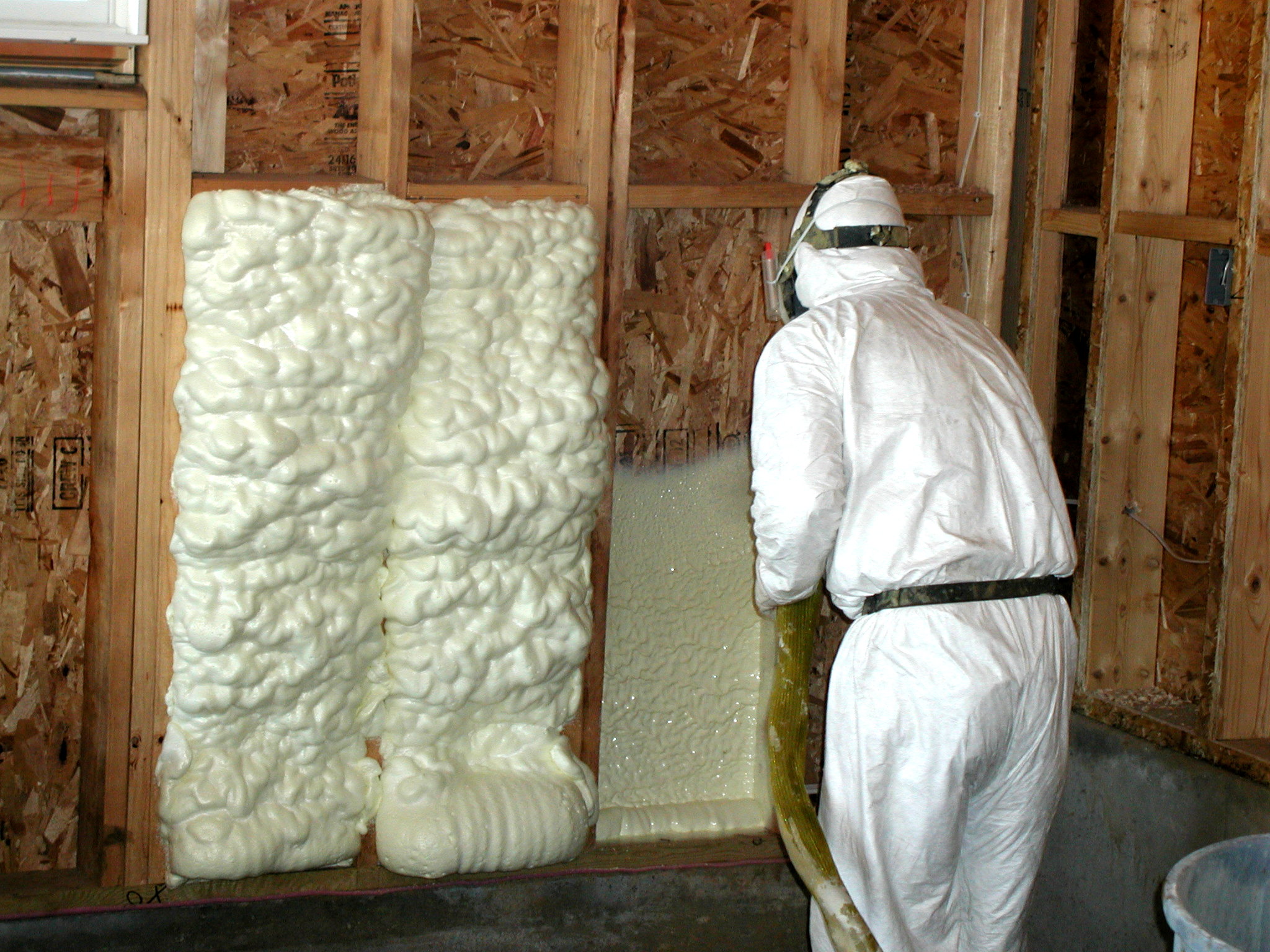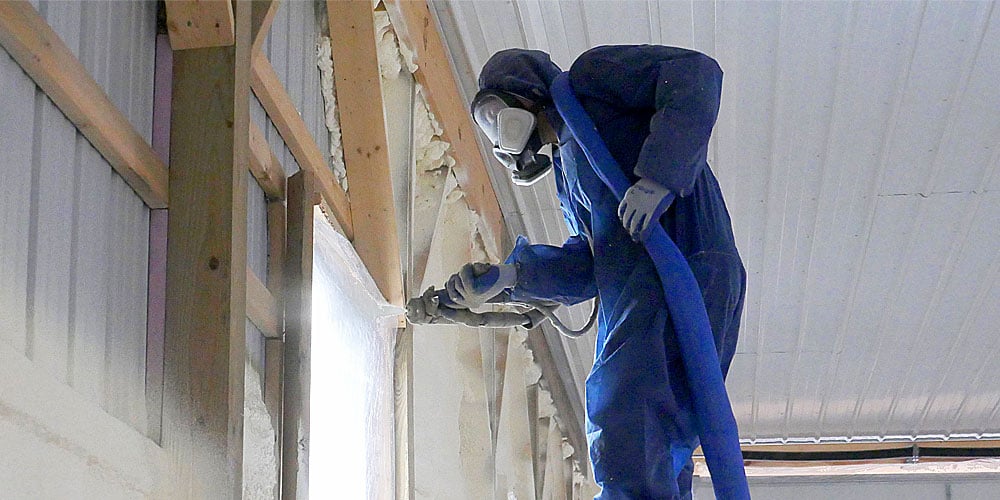Spray Foam: The Ultimate Service for Air Sealing and Insulation
Spray foam insulation has emerged as a leading solution for effective air securing and thermal insulation, offering an one-of-a-kind mix of residential properties that establish it in addition to traditional approaches. Its capability to expand and fill gaps makes it specifically efficient in stopping air leak, which can dramatically influence power efficiency. Nonetheless, comprehending the full scope of its benefits, setup procedures, and comparisons with various other insulation types is important for making informed decisions. As we explore these facets, the implications for both brand-new building and constructions and retrofits come to be progressively substantial. What elements should influence your choice?
What Is Spray Foam?
Spray foam is a versatile insulation material that integrates the concepts of air sealing and thermal resistance to enhance energy effectiveness in structures. Composed mainly of polyurethane or various other similar substances, spray foam is used as a fluid that expands upon call with surface areas, creating a strong, continual layer of insulation. This special residential or commercial property enables it to load gaps, fractures, and gaps that standard insulation products may overlook, providing a remarkable air seal.
There are 2 main sorts of spray foam: open-cell and closed-cell. Open-cell spray foam is lighter and much more adaptable, offering excellent noise absorption and a lower R-value per inch - Spray Foam. In comparison, closed-cell spray foam is denser, offering a higher R-value, dampness resistance, and added architectural honesty to constructing parts
The application procedure generally includes specific devices, making certain a smooth application that abides by different substrates, consisting of concrete, metal, and timber. This adaptability makes spray foam ideal for both brand-new building and constructions and retrofitting existing frameworks. Its ability to create an airtight barrier significantly adds to lowering energy intake and boosting indoor air quality, consequently making it a favored option among building contractors and home owners alike.
Advantages of Spray Foam Insulation
One of one of the most substantial advantages of spray foam insulation is its phenomenal capacity to develop a constant air barrier, which successfully decreases energy loss. Unlike traditional insulation products, spray foam increases to fill gaps and cracks, ensuring that air leak is substantially minimized. This particular not just boosts energy effectiveness but also brings about decrease utility costs over time.
Additionally, spray foam insulation offers remarkable thermal resistance, adding to a much more secure interior atmosphere. Its high R-value per inch permits efficient insulation in constrained areas, making it ideal for attic rooms, wall surfaces, and crawl areas. Furthermore, the moisture-resistant residential properties of spray foam assistance stop mold and mildew and mildew development, advertising much healthier living problems.
Another crucial benefit of spray foam insulation is its sound-dampening high qualities (Spray Foam). It effectively lowers sound transmission in between rooms, producing a quieter and extra comfortable home environment. The durability of spray foam also stands apart, as it does not sag or work out in time, keeping its performance throughout its lifespan
How Spray Foam Functions
Understanding how spray foam insulation functions is important for valuing its effectiveness in air securing and thermal resistance. Spray foam insulation is composed of 2 key parts: isocyanate and polyol material. When these elements are mixed, they undertake a chain reaction that triggers the product to broaden quickly, creating a dense foam that Check Out Your URL fills up dental caries, gaps, and splits.
As the foam expands, it abides by surface areas, developing an impermeable seal that considerably minimizes air infiltration. This particular makes spray foam insulation extremely effective at avoiding drafts and dampness penetration, which can bring about power loss and damages in time. Additionally, the closed-cell variation of spray foam provides premium thermal resistance as a result of its stiff framework, properly reducing warmth transfer.
The special homes of spray foam enable it to comply with uneven surface wikipedia reference areas, guaranteeing extensive coverage and a seamless barrier. Therefore, spray foam insulation not only boosts power efficiency however additionally adds to improved indoor air high quality by minimizing the buildup of irritants and pollutants. Eventually, comprehending the auto mechanics behind spray foam highlights its role as a premium choice for insulation and air securing in both business and household applications.
Installment Refine Introduction

Prior to installment, the space has to be sufficiently cleaned and prepped, guaranteeing that surfaces are complimentary from dirt, wetness, and particles. Since impurities can jeopardize bond and overall efficiency, this action is vital. Once the area is prepared, the application entails mixing both components of the spray foam, which expands upon call and fills gaps successfully.
Educated experts should conduct the setup, utilizing specialized devices to make sure uniform protection and optimum thickness. Safety and security preventative measures, including wearing safety gear and making certain appropriate air flow, are essential during this procedure. After application, the foam typically treatments promptly, creating a strong obstacle that boosts power efficiency.
Comparing Spray Foam to Conventional Insulation
When assessing insulation choices, spray foam insulation stands out in More hints comparison to traditional materials such as fiberglass and cellulose. Unlike fiberglass and cellulose, which can enable air seepage, spray foam expands upon application, loading spaces and holes to produce a closed seal.
In addition, spray foam gives a higher R-value per inch than traditional insulation kinds, offering more reliable thermal resistance in a thinner account. This characteristic is particularly beneficial precede with restricted dental caries deepness. Additionally, spray foam is immune to dampness and mold development, which can be a substantial worry about cellulose and fiberglass, specifically in humid settings.
However, spray foam insulation typically brings a greater upfront price than its conventional counterparts. Property owners must consider this preliminary investment against long-term energy cost savings and performance advantages. Ultimately, while both insulation types serve their function, spray foam becomes an advanced remedy for contemporary insulation needs, specifically in terms of air sealing and thermal effectiveness.

Conclusion
In summary, spray foam insulation stands for a highly effective option for attaining optimum air sealing and thermal resistance. Its distinct residential or commercial properties, including moisture resistance and audio dampening, make it appropriate for various applications in both brand-new buildings and retrofitting projects (Spray Foam). The first prices might be higher compared to conventional insulation materials, the long-term benefits, such as significant power savings and boosted interior air high quality, justify the investment and underscore its value in modern building techniques.
Spray foam insulation has emerged as a leading remedy for reliable air sealing and thermal insulation, providing a special combination of homes that set it apart from traditional methods.Spray foam is a functional insulation product that integrates the principles of air securing and thermal resistance to boost energy performance in buildings.When assessing insulation choices, spray foam insulation stands out in comparison to conventional materials such as fiberglass and cellulose. Ultimately, while both insulation kinds serve their purpose, spray foam arises as a much more advanced service for contemporary insulation requirements, especially in terms of air sealing and thermal effectiveness.
In recap, spray foam insulation represents a highly efficient service for achieving ideal air sealing and thermal resistance.